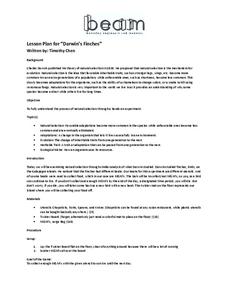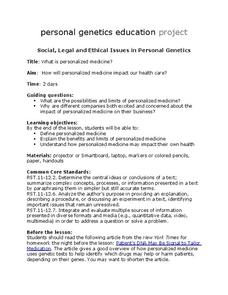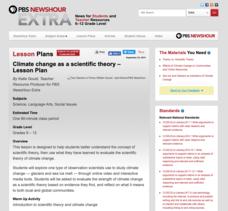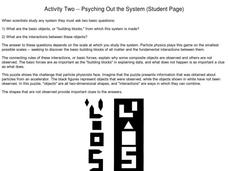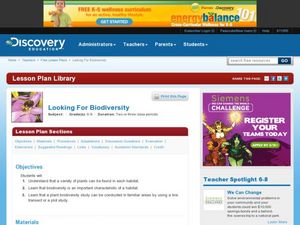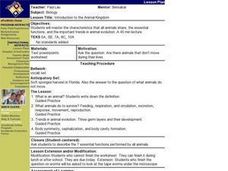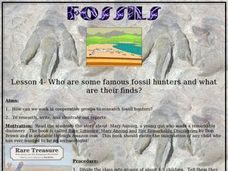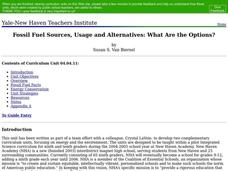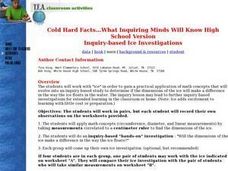Curated OER
Big Air Rules
Students discuss projectile motion using a basketball player taking off for a slam dunk, a fly ball launched off a hitter's bat, and a snowboarder flying off a pipe as examples. The lesson is expanded by introducing the mathematical...
Berkeley Engineering and Mentors
Darwin's Finches
Try a twist on the old finch beak and chopsticks activity by using M&Ms on a Twister mat. Spoons, knives, forks, and chopsticks represent beaks and are randomly assigned to your little birds, who must collect as much food as possible...
Curated OER
Food for Spaceflight
When astronauts get hungry in outer space, they can't just call and have a pizza delivered. In order to gain an appreciation for the challenges associated with space travel, young learners are given the task of selecting,...
Personal Genetics Education Project
Personalized Medicine
Genetics learners read an article and watch a video about personalized medicine and the hope it holds for treating patients more specifically than doctors currently are able to. They research, design, and produce a brochure about the...
Curated OER
But I'm Not a Writing Teacher!
How teaching writing skills in the science classroom will benefit your students as they transition to Common Core.
Norwich Institute for Language Education
Simple Machines
Planning a unit on simple machines? Save some time and energy with this collection of lessons and activities that explores how these devices are used in the real world to make life a little easier.
Curated OER
What's Special About Nonfiction?
Young scholars examine the difference between nonfiction and fictional writing. They identify the characteristics of nonfiction literature and examine how a nonfiction textbook organizes information.
PBS
Climate Change as a Scientific Theory
Get your class thinking about climate change as a scientific theory. Guided by a handout, emerging earth scientists read articles and take notes about glaciers and sea ice. To conclude, they write an evaluation of the evidence for...
Artisan Global
QuakeFeed Earthquake Map, Alerts and News
Amateur seismologists explore Earth's earthquakes in real time using a variety of map styles and parameter selections.
Curated OER
The Rain Cycle
Third graders draw the rain cycle. In this rain cycle lesson the students listen to the story The Legend of the Bluebonnet by Tommie DePola. As they listen to the story they sketch what is happening. The students write a sentence for...
Curated OER
Activity Two--Psyching Out the System (Student Page) Asking Questions, Using Clues
Students observe two-dimensional shapes and work on the challenge that what is observed is as important as what is not observed.
Students determine constructions, rules and connections.
Full references listed for further reading and...
Curated OER
Stream Watch
Students discuss why it is important to take care of streams, what is non-point source and point source pollution, what are some causes of pollution in streams, and what can we do to prevent some of these causes of pollution? They steam...
Curated OER
Antarctica
Students explore why Antarctica is so important to the planet. They investigate the physical characteristics. Students create their own unique treaty of governance for Antarctica and discuss how laws are enforced in Antarctica.
Curated OER
Earthquakes
Fourth graders explain what is an earthquake and know which area is an in high risk. They know what damage the earthquake cause and know the earthquake safety principles.
Curated OER
Looking for Biodiversity
Students explore habitats and see that there are a variety of plants that can be found and that biodiversity is an important characteristic. In this biodiversity lesson students complete an activity that explains how to perform a...
Curated OER
The Unknown Secrets of the Rain Forest
Learners explore the rain forest and where they are located. Students examine why the rain forests are important and what is happening to them. They investigate the water cycle and life cycle of a frog. Learners build a rain forest in...
Curated OER
ARE WE IN THE MIDDLE OF A MASS EXTINCTION?
Students identify and interpret the following: What is mass extinction, and what are some theories for why it happens? How often do species become extinct? What is the normal rate of extinction? Why are some species endangered? What...
Curated OER
What is your future career?
In this interview process worksheet, students work in pairs to interview each other using the twenty questions given. Student culminate their information and choose a career from the list given. Students write a sentence justifying...
Curated OER
Introduction to the Animal Kingdom
Students are asked: Are there animals that don't move during their lives. They are asked what is an animal? Students discuss what animals need to survive. They are taught the trends in animal evolution. Students discuss the three...
Curated OER
You're the Expert Now
Students evaluate information about mental illness for accuracy and relevance as they examine brochures developed in the lesson by their classmates. Data about mental illness is revisited and adjusted for additional information obtained...
Curated OER
Fossils Lesson 4 - Who Are Some Famous Fossil Hunters and What Are Their Finds?
Learners research and develop a presentation about a famous fossil hunter/archaeologist. In this fossil hunter/archaeologist instructional activity, students listen to a reading of Don Brown's, Rare Treasure: Mary Anning and Her...
Curated OER
Fossil Fuel Sources, Usage and Alternatives: What Are the Options?
Students examine the relationship between energy and the environment. In groups, they participate in experiments to discover the law of thermodynamics and the differences between potential, kinetic and mechanical forms of energy. They...
Curated OER
Diet: You Are What You Eat
Third graders examine the issue of food quality to assess the dangers of pesticides, additives, and improper food preparation. After keeping food diaries and categorizing foods, they fill in food pyramids based on their journal entries....
Curated OER
Cold Hard Facts...What Inquiring Minds Will Know
Students work with "ice" in order to gain a practical application of math concepts that evolve into an inquiry-based study. They determine if the dimensions of the ice make a difference in the way the ice floats in the water.

